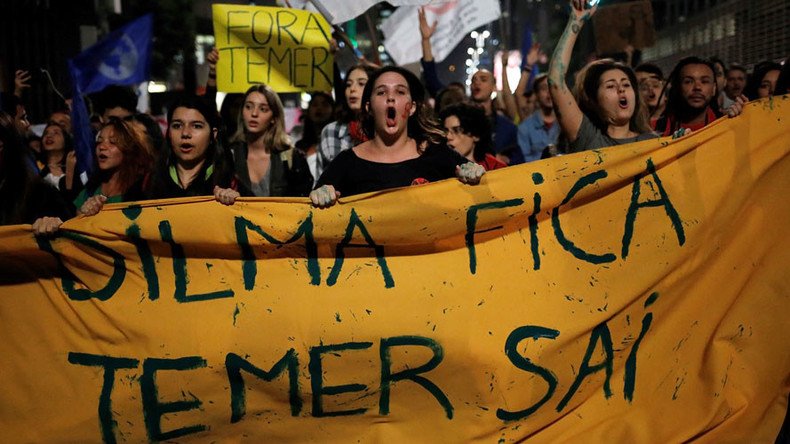Assault on democracy in Brazil must not succeed

The attempt to roll back the progress of the Bolivarian revolutions in Latin America is being played out in real time for all of us to see. It is a narrative which we have become all too familiar with.
The latest victim, Brazil, a relatively new democracy following years of military dictatorship supported by the US, is engulfed in a political crisis, underpinned by serious charges of corruption aimed at the government.
At the same time, it is clear, as has been the case in the past, that the influence of the CIA is playing a key role in seizing on the political turmoil to bring about a conclusion that will favor Washington, and also Brazil’s wealthy elite.
The impeachment of Dilma Rousseff is being backed and called for, by precisely the same power brokers who support a return to unconstitutional dictatorship and the rolling back of progress. Indeed, the scrapping of the constitution would signify a move towards the very same system which once tortured dissidents like the now sidelined and democratically elected Rousseff.
What is happening in Brazil is being dubbed a ‘soft coup’, but for anyone paying attention, the sequence of events have a chilling resemblance to the coup waged against Hugo Chavez, the former Venezuelan leader, in 2002. During the coup, which was again supported by the US and the CIA, Chavez who introduced many highly successful social reforms since 1998, saw his name dragged through the dirt by an entirely corporate controlled media whose interests were firmly aligned with the wealthy class and power elite in Venezuela.
Rousseff, like Chavez, has been a champion for Brazil’s indigenous population and those who are marginalized. Rousseff, also like Chavez, is being mocked and patronized by the gutter press in Brazil, who behaved the same way when Lula was in office, highlighting his working class accent as if it were something to be ashamed of.
For too many among the wealthy elite and bourgeoisie in nations like Brazil, socialism is still a dirty word. Literacy, political empowerment, health, education, and the nationalization of resources, represent social advances which are viewed as a threat to the existing social, political, and economic order, just as they are in Venezuela. This is the real reason why Rousseff’s political opponents within and without, want to see her removed.
Political corruption has tarnished the entirety and every section of Brazilian political life, although Rousseff herself is not under question personally, but rather her cabinet members. The economy is in a slump, but many experts argue this is largely due to the financial collapse in Wall Street in 2008, and the ripple effect it had throughout the global market.
Opposition members though, who are calling for Rousseff’s head, are themselves being investigated for corruption including former vice president Michel Temer who is now interim leader, while Rousseff faces the witch hunt against her.
While the government led by Dilma Rousseff is far from perfect, and has serious questions to answer from the masses of poor Brazilians who are overwhelmingly non-white. Rousseff and her centre left workers party have lifted many millions out of poverty. Indeed, Rousseff won 52 million votes in the last election two years ago, and this support stands in stark contrast to the million or so people nationwide who took place in recent anti-government demonstrations.
While Rousseff’s support is no doubt suffering due to the recent debacle, according to polls she still remains significantly more popular than Temer who only has about 2 percent support among Brazilians.
While there is no doubt widespread discontent concerning Rousseff’s government, many people see the demonstrations as reflecting the remaining racial and class division’s still endemic in Brazilian society.
The protests also reflect the anger felt by those whose interests are more aligned to Washington, that they have been unable to remove Rousseff’s worker’s party from office democratically. But while protesting is a democratic right, protests themselves should not remove governments in a democracy.
Indeed, many feel that if Rousseff remains out of office, that democracy would have been well and truly undermined. Despite the evident problems in governance, the fact remains, that under a socialist government the social fabric of Brazil began to move forward and transform.
Rousseff passed the kind of social reforms first introduced by Venezuela, following the Bolivarian model of revolution adopted by Cuba, a nation long hailed as being the trailblazer for revolution in the region. Rousseff’s government tackled housing, education, and health.
But ever since the emergence and strengthening of the BRICS economies, coupled with the plummeting value of the US dollar, Washington has continued its pattern of seeking to prevent the independent development of socialist economies in Latin America.
The world is watching closely to what is happening in Brazil. More and more people also are beginning to view what is happening in Brazil within a global context. The coup, and assault on democracy in Brazil, and that’s what this is, is no different from the coup waged in Honduras, or the regime change backed by the ‘empire’ in Ukraine. Its origins can be found among the same power brokers that sought unsuccessfully to bring about a change of government in Syria.
These coups ultimately are a proxy war, a wider global power struggle led by nations building their economies and developing beneficial relationships with other nations, which is in turn challenging the hegemony and dominance of the US. The removal of Gaddafi in Libya is yet another example of the neoliberal economic policies of the West clashing with the independence movements of global south countries which are surely and steadily breaking free from the clutches of the ‘empire’.
Brazil's acting president used to be US intel informant - WikiLeaks https://t.co/a8nyxv33ix
— RT (@RT_com) 16 мая 2016 г.
And what role will nations like Russia continue to play, in supporting countries which challenge the neoliberal order which seeks to bolster its own wealth by monopolizing resources? Increasingly, as nations which are challenging imperialism build more unity between them, such emerging economies will continue to severe their ties with and ‘empire’ which exploited them, and strengthen ties with those nations which seek to ferment a stable and mutually beneficial relationship.
What is taking place in Brazil is unconstitutional, has no legal precedent and is profoundly undemocratic. It is also showing us, just how powerful and manipulative a privately controlled media can be in countries like Brazil.
The media frenzy waged against Rousseff’s workers party in Brazil is working as one with the political elite with the sole aim of rolling back any progress made in recent years.
The sad thing is that the plan being implemented at present, to shred any semblance of democracy in Brazil, is carried out in almost the precise manner as the coup in the 1960s. The ruling elite and media backed by Washington plain and simply want to prevent any further independent development of any of the BRICS nations including Brazil. We have seen history repeat itself many times before. How many more times must we see this scenario play out before the world wakes up and has enough.
Rousseff’s government was far from perfect. But the lightning quick destruction of progress in Brazil can be summed up in how the new government looks. Rousseff’s government went from being ethnically diverse with many women, reflecting how the country looks. The government now looks as if it has been colonized, with the entire cabinet being male and white. A symbolic and practical reversion to represent colonialism once more if ever there was one.
The statements, views and opinions expressed in this column are solely those of the author and do not necessarily represent those of RT.














